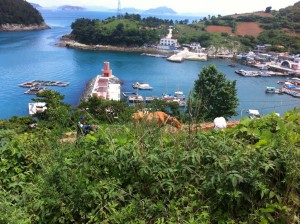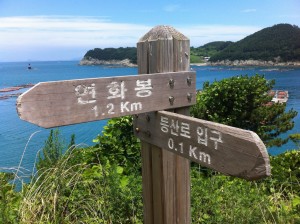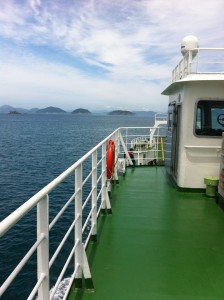Caveat: this post, ostensibly about a trip to the southern coast of Korea, is girded by my participation in an open course on mlearning (Udrift) and my general interest in mobile learning in general. So there are observations here that are referential to those things. Also, I might split observations into a few different posts to spare the reader as there was a lot to work with. This post more or less focuses on the emotional terrain of this journey. Please note that media from the trip can be found at the end of the post in case anyone wants to become more firmly immersed in the sensory particulars of the travel.
Seoul to Daegu to Tongyeong to Yeonhwado
I recently (as in yesterday) took a short journey along with my wife to the southern coast of Korea, far from the confines of bustling Seoul. This journey was intended to be a quick jaunt to somewhere we have never been, wander, eat well and revel in the motion of pastoral flaneurie.
On a side note, I feel as though Korea has a cultural equivalent of the flaneur, although skewed towards socioeconomic status. The yangban, although generally sedentary, encapsulates a bit of this general curiosity about the world that I believe the flaneur demonstrates.
So the journey involved the following:
- Seoul to Daegu via train
- Exploration of Daegu for more of my wife’s family history
- Bus from Daegu to Tongyeong
- Ferry from Tongyeong to the farther islands off the coast
- Exploration of one island (Yeonhwado (연화도))
- Return to Seoul via bus
This represents the chronological and geographical sequencing of the trip. However, the emotion and intellectual geography of the journey skewed differently. There was another layer of psychogeography being enacted in this journey colored by the emotional content of the traveler and the contrasts in the travel.
Psychotherapy: the study of the precise laws and specific effects of the geographical environment, consciously organized or not, on the emotions and behavior of individuals.
Psychotherapy of rustic travel and the emotional context of flux
So the psychogeography in question here is my own and my relationship to my ever fluctuating physical environments. I am based in Korea (temporarily), am relocating to the US in a month, and then to the UK in September for a PhD, all without my wife (who won’t be joining me in the UK until the end of my first year). I am passing through a series of geographical, emotional, and intellectual states in the next few months, in a life that was already predicated by lots of motion (business or personal travel, different ‘home’ locations, etc.). All of this is affecting my emotional and intellectual state of being (both positively and negatively). Motion of this variety is all encompassing and one feels as if they are floating through this artificial calm at the center of a large storm (of one’s own making).
My need for mobility (academically, geographically, intellectually, emotionally, socially) has created a tempest of motion. This is my drift, my environment for analyzing my work.
So, a trip to someplace new with my wife shortly ahead of our temporary separation creates a cauldron of emotional and intellectual content, an augmented psychogeography contrasted against the pace and structure of fishing communities dependent on ferry travel for news and supplies from the mainland. There are too many contrasting elements to name there, but it is a world of hefty and ephemeral opposition (not a bad thing).

Tilling the fields with a cow; my documentation via my iPhone
Much of this intellectual content is influenced by sensory inputs (the most stark, in my opinion, being audio). Much is influenced by the general contrast between what is known (home) and what is novel. For me, this journey was marked by an urgent and, at times, subtle transition from urban to rural to urban. I felt Seoul slide away and the stillness of a fishing village creep over me. I then felt that stillness fade away with the first burst of the ferry motor away from the dock.
All of this experience was clouded by time. Knowing that my time here is nearing a close. Knowing that my time with my wife (here in Korea) is drawing to a close. The finality of experience and geography. Memory as the intersection of time and geography.
Drawing Conclusions from Environment
Now I should be looking for a pithy conclusion to this post, a conclusion that encapsulates motion and mobility with intellectual and emotional balance, but I haven’t found that yet. What I am sure of is that environments this pregnant with emotion, with geographical or psychogeographical substance, must be supportive of intellectual discovery. They must be supportive of a hybridized learning structure of emotional, intellectual, and geographical contrasts. Where there is smoke there is fire. And when there is a bus, a ferry, or a train, I will take it.
I do think that exploring these pregnant environments, this all-encompassing geography, is productive for mobile learning as it will unlock the intersections of discovery. Those times when a thousand emotions and a thousand memories and a thousand parallel journeys are all enacted in space. Academically, an amazingly verdant place.
As for those that might be interested, some photos from the journey are available here (or just look through them below). Also, I am providing some audio recordings I did of ambient sounds. I regret not grabbing more audio from the island itself as it was a wonderful contrast of the stillness of the land and the volatility of the ocean water crashing against the shore. Maybe next time.
KML
(click on the image to get the KML of the journey)




[…] yesterday, not intentionally as part of the UDrift course, but it certainly seems to feed into the psychogeography post I wrote earlier for that course. The first bit is when I stumbled across a construction site […]